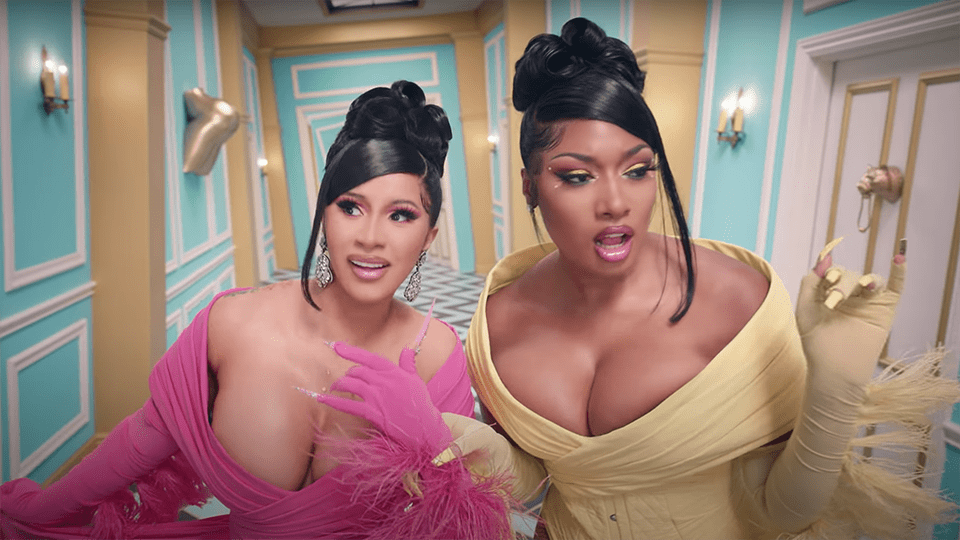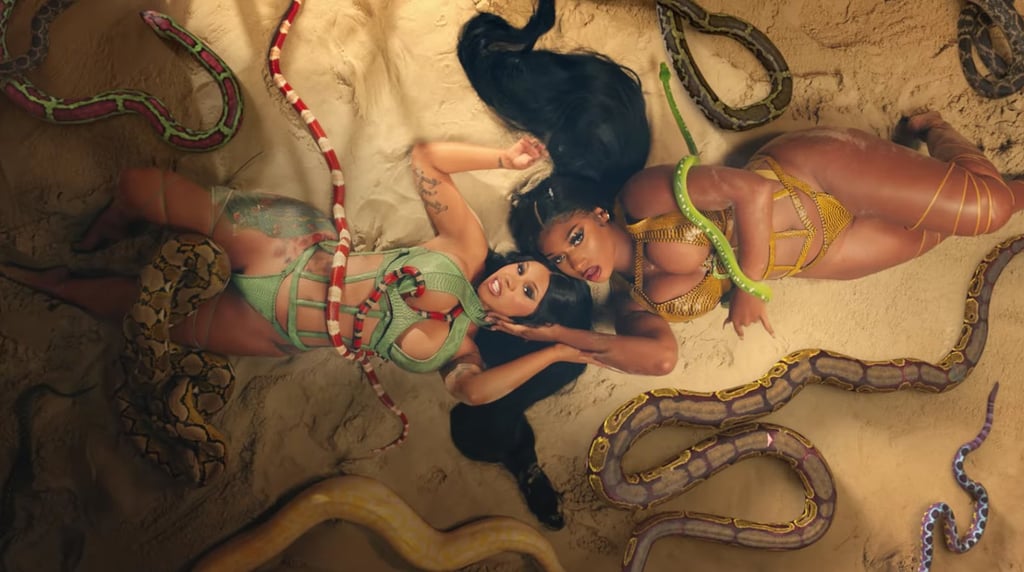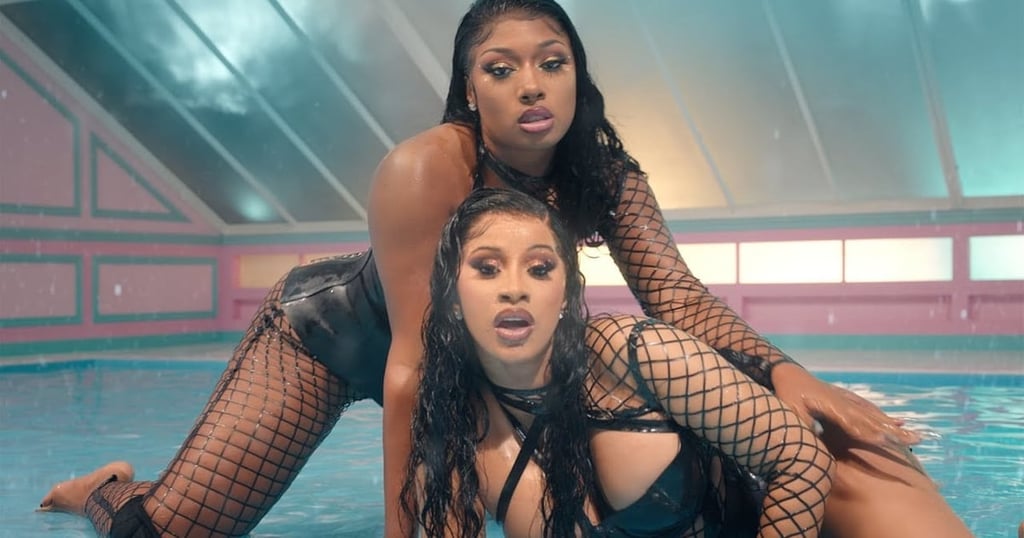Cardi B's and Megan Thee Stallion's "WAP" [1] is a certified hit — a historic one at that, with an unprecedented 93 million streams its debut week [2]! From the sex-positive lyrics to the unapologetic illustration of badass women, the song and the music video are both iconic. Not to mention, the artists' $1 million giveaway in celebration of female empowerment [3] proves that the sensation surrounding "WAP" is an extraordinary one.
However, false medical declarations, arguments about "WAP" promoting female objectification, and other critical claims demonstrate that the new anthem is being met with some pretty intense backlash as well [4]. I've compiled a list of some of the top criticisms of "WAP"; but don't worry — I have rebuttals.
Argument #1: “Cardi B and Megan Thee Stallion are Bad Role Models”

One could absolutely make a point that Cardi B's and Megan Thee Stallion's following bases consist of many young, impressionable girls — it's true. Just like a vast majority of public figures, Cardi B and Megan Thee Stallion put out content on social media that's accessible to people in many different age groups. However, just because content is accessible by a wide range of demographics doesn't mean that it doesn't have an intended audience — and young children don't represent who this song is meant to appeal to in any capacity.
"WAP" is not a G-rated song, but it doesn't make an artist a bad person to produce content that is not for kids. These are two women in their 20s who are expressing themselves how they choose, basking in well-deserved success, and simply living their best lives.
If your child is young, and you feel as though "WAP" falls out of the scope of what they should be consuming at that age, simply turn it off. In fact, many popular streaming platforms like Spotify and YouTube have parental control features available to make it easier to do just that –– don't jump to shaming these women for putting out content that empowers them (and many others) just because it's not what you want your kids listening to.
Argument #2: “A Wet Ass P*ssy Is Not Healthy Or Normal”

There are a handful of different standpoints from which people are criticizing "WAP", but possibly one of the most outrageous angles is that of denying human anatomy. Conservative political commentator Ben Shapiro, for instance, took to Twitter to advise the women involved in "WAP" to seek "medical care," [5] and he claims his "doctor wife" considers wet ass p*ssy to be a symptom of bacterial vaginosis or a yeast infection.
First off, people with p*ssies don't need to be mansplained to how their bodies work. Secondly, any legitimate gynecologist [6] will tell you that the phenomenon this song centres around is completely normal. In fact, in response to Shapiro, Daniel Grossman, MD, asserted that WAP is not only normal [7], but it's important. Promoting a narrative that suggests otherwise is not only harmful, but it's scientifically inaccurate.
Argument #3: “The Song Promotes the Over-Sexualization of Young Women”

Women have been sexualized and over-sexualized by men for ages, in many contexts where they didn't want to be — but God forbid a woman sexualizes herself.
Don't get me wrong — there's no justifying or down-playing the gross sexual objectification that women have faced over the course history, especially women of colour. (Because let's be real: Lady Gaga [8] has a song illustrating vivid sex dreams and lyrics about taking a ride on a "disco stick", but she was met with almost exclusively positive feedback for her sexually liberating lyrics and empowering spirit. Do you see what I'm getting at here?) Nonetheless, any argument that suggests that women shouldn't sexually express themselves if they don't want to be sexually objectified is not only misogynist, but it's a bit sadistic.
It's also a similar line of logic to that which justifies girls in public schools being prohibited from showing their shoulders because it might distract and entice their male counterparts. A woman is not a piece of meat, and it's regressive to suggest that based on how she dresses, how she dances, or how she artistically (or sexually) expresses herself, that she should be looked at as such. "WAP" is explicit, no doubt. But it's flawed to assume that Cardi B and Megan Thee Stallion are somehow condoning or promoting that kind of sexist narrative by making a graphic song about sex.
Argument #4: “The Song Perpetuates Violence Against Women”

It's disappointing that something like this has to be clarified, but let's say it together: "violence towards women is not the fault of women." The fault lies with aggressors who commit violent and disrespectful acts on misogynist bases.
There's no denying that violence against women exists; it's an unfortunate reality. According to the National Sexual Violence Resource Centre, 91 percent of sexual assault victims identify as female [9]. This discrepancy has a lot do with how patriarchal structures have been perpetuated over the course of history and how those structures have resulted in distorted cultural views of women as "lesser" or "weaker." So, if we want to discuss breaking cycles of sexist violence and disrespect, we need to shift the conversation away from policing women and their actions, and instead, start talking about how we're going to raise the next generation to respect women and view them, regardless of their sexual expression, as humans — not objects.
Argument #5: "It's Too Vulgar For Mainstream Radio"
Cardi B and Megan Thee Stallion are not the first women to release provocative music relating to women's sexual freedom, and they won't be the last. Lil' Kim [10], for example, is regarded as one of the OG's of the rap game, and her notoriously raunchy lyrics are part of what earned her that title. She broke boundaries and reclaimed degrading, sexual terminology that was used to objectify women and made it empowering instead.
Sexuality is also a ubiquitous concept in hip-hop and rap music, and it's not as though Cardi B's or Megan Thee Stallion's previous content shies away from sexual themes. What seems to cause commotion, however, is when explicit terminology like "wet ass p*ssy" is used by female artists. Because let's face it: from Lil Wayne to Chris Brown [11], many male hip-hop artists have made their way to the mainstream by rapping and singing about sex in some of the most vulgar ways possible (and they continue to do so without even a second glance). They talk about what positions they like, what kind of women they find attractive, and what sexual activities they want to perform –– oftentimes describing these things in as much, if not more detail than WAP does.
There's no place for gender-based double standards in 2020, let alone in the arts. And at the end of the day, it may not suit everyone's palate, but there's nothing wrong (or at least there shouldn't be) with female artists creating bold, sex-positive music [12].